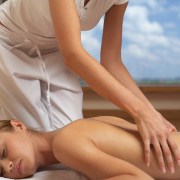 Photo: Getty Images
Photo: Getty Images
Living in Asia means getting used to a lot of things ... really inexpensive massages being one. Throughout my time in Asia, I’ve gotten used to the many health benefits that come with massage. Throughout my experiences here, I have indeed chosen a favorite type of massage.
Thai massage isn’t like the massage you might be used to. Traditional massages usually entail lying in one position and being kneaded for an hour or so -- a lovely experience nonetheless.
Thai massage, also known as a yoga massage, is a little more rigorous than a regular Swedish type of massage. During a Thai massage, the therapist will stretch you, put you in all kinds of different positions, and massage by applying pressure in areas throughout your whole body with thumbs, arms, elbows, feet and knees.
As with the Chinese perspective, Thai massage works along the energy meridians of the body. It is believed that by physically stimulating the energy (or Qi) in these specific areas, you can help to move the stagnant energy and create a more healthy flow of energy for optimal health.
In a Thai massage, the massage therapist will manipulate these energy meridians until it feels that the energy is no longer stagnant. Once the tension and flow of energy has improved, they will begin the stretching.
The different types of stretching performed during the massage is really quite astounding! The massage therapist will contort you in strange but fantastic ways that may surprise you!
Although there are some parts of a Thai massage that might feel a little uncomfortable or awkward, I've never walked out of one feeling anything short of amazing. And this is because the myriad of health benefits that come from a Thai massage.
Blood circulation: Just like yoga poses, the different positions in a Thai massage slow the blood circulation in certain areas, then release new fresh blood to those areas.
Muscle tension: Many people, including myself, feel that after a Thai massage muscles feel much more loose for days if not over a week!
Muscle spasms: The stretching in Thai massage, like yoga positions, helps to lengthen your muscles, thus relieving tension and reducing spasms.
Mental and emotional wellbeing: According to Livestrong.com, “The Substance Abuse and Mental Health division of the United States Department of Health and Human Services, lists both yoga and massage therapy as alternative approaches to mental health care." A Thai massage can also act as a type of meditation, helping to clear the mind.
According to Bodyharmonics.com, Thai massage can also help with intestinal problems like IBS and constipation, as well as headaches, sciatica and back/neck pain.
Thai massages usually last about one hour, but can go longer. A Thai massage therapist will be trained to use soft or hard pressure, depending on your preference. During a Thai massage, it's best to wear loose comfy clothes. If you're not prepared, many places will provide these.
If you've never experienced Thai massage, treat yourself to one and be amazed!
Sources:
Wong, c. (2011, September 26). What is Thai Massage. Alternative Medicine - Everything You Need to Know About Alternative Medicine. Retrieved November 1, 2011, from http://altmedicine.about.com/od/treatmentsmtoq/a/Thai_Massage.htm
The Health Benefits of Thai Massages. (2011, March 15). Fitness, Health & Well-Being | FitSugar. Retrieved November 1, 2011, from
http://www.fitsugar.com/Health-Benefits-Thai-Massages-14919277
What is Thai Massage?. (n.d.). Acupuncture, Chinese and Thai massage - courses, treatment and videos. Retrieved November 1, 2011, from http://www.bodyharmonics.co.uk/press-releases/review-what-is-thai.htm
Adkins, C. (2010, May 31). Benefits Of Thai Yoga Massage | LIVESTRONG.COM. LIVESTRONG.COM - Lose Weight & Get Fit with Diet, Nutrition & Fitness Tools | LIVESTRONG.COM. Retrieved November 1, 2011, from http://www.livestrong.com/article/135880-benefits-thai-yoga-massage/
Reviewed November 2, 2011
by Michele Blacksberg RN
Edited by Jody Smith





Add a CommentComments
There are no comments yet. Be the first one and get the conversation started!